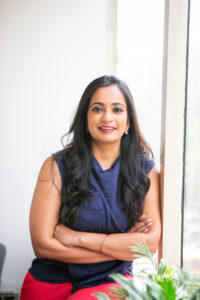Tap into the collective power of influential business and NGO pioneers to create new strategies and
tactics to build a more socially and environmentally conscious world.

Tap into the collective power of influential business and NGO pioneers to create new strategies and
tactics to build a more socially and environmentally conscious world.
Rhea Mazumdar Singhal
Company/NGO Name:
Ecoware
Region, Country:
New Delhi, India

1. Personally—Why do you care about sustainability? What is your story?
As a mother of two young children I have witnessed first hand the debilitating impact of air pollution on the young. As a former pharmaceutical executive I have read and followed clinical research linking toxins in plastics to adverse health. As a resident of Delhi I see stray animals in my neighborhood feeding on discarded single-use plastics amongst the trash. It could be very easy to live in a bubble and do nothing or to blame the government for reneging on their promises. However I do not want my children to inherit my problems and Ecoware is my vehicle to create lasting change.
2. What inspired you to choose your career path?
My most noteworthy experience since graduating from university has been my passion to create a sustainable product that positively impacts our lives and the environment, prior to which I was a senior sales executive in the Oncology team at Pfizer UK.
I have always challenged myself to succeed outside my comfort zone, a key example is when I gave up a secure job to create a new industry in a new country.
At 27, I successfully founded India’s largest sustainable food packaging company, Ecoware. Ecoware represents our need to provide a healthy, hygienic and sustainable alternative to toxic plastics that are damaging the human race.
3. What is the mission of your company/NGO?
Plastic pollution is one of our planet’s greatest environmental threats. Every year north India is blanketed by severe air pollution caused by the unchecked burning of crop stubble. Farmers burn their crop waste because this is the easiest, quickest and cheapest mode of disposal. Ecoware is a simple, elegant solution that solves both these problems at the same time. Ecoware converts common agricultural waste (rice straw, wheat straw and sugarcane bagasse) into fully biodegradable, compostable and natural food packaging solutions (plates, cups, bowls and trays) which are a sustainable alternative to single-use plastics tableware.
4. What is the most innovative or environmentally/socially impactful project/practice your company/NGO has implemented?
Ecoware takes immense pride in being over-certified. Ecoware is the only USDA Bio-based certified manufacturer in India, is PFAS free, and has been audited on Environmental, Social and Governance (ESG) parameters and achieved $2.41 of impact for every $1 invested. Ecoware has been recognized for its efforts to promote the principles of a circular economy by finishing runner up in the Indian Circular Economy Awards and by being a finalist at The Circular Awards presented by the World Economic Forum in Davos.
5. How have those projects positively impacted the local community and/ or your country?
Ecoware impacts:
6. What are the biggest challenges you have faced when pursuing or trying to promote sustainable practices/projects?
When I started on this journey 10 years ago, none of my stakeholders understood what it meant for a product to be truly 100% biodegradable or compostable. My team and I have spent time to educate our consumers via various forums in schools, hospitals, and through community engagements. We have partnered with retailers on the health benefits of using Ecoware over plastic and on the obligation we share to dispose our waste responsibly and hence, created a brand around health and wellness, which is the first time anyone has done this for food packaging.
7. What are your thoughts on climate change? What is your company/organization doing to help bring awareness or to help mitigate climate change?
Personally I feel, it isn’t something you can escape. A lot people feel that it won’t affect them, but that isn’t true extreme weather will affect productivity will cost you as a business and the global economy over all
At Ecoware, Our objective is in sync with the UN Sustainable Development Goals and a circular economy is well aligned to our vision of a sustainable society. We use our business as a platform for change by educating all our stakeholders to make better choices for themselves, their communities and the environment
8. What are your top 3 career accomplishments?
Rhea Mazumdar Singhal is the Founder and CEO of Ecoware, India’s first and largest sustainable packaging company. Rhea was awarded the Nari Shakti Puraskar, the highest civilian honour for women by the President of India. Rhea is a World Economic Forum Young Global Leader (2018) and an Asia 21 Young Leader (2019). Rhea is an invited member of the Confederation of Indian Industries (CII) National Committee on Women Empowerment and CII India CEO Forum on Air Pollution, she is also the Chairperson for the Indian Women Network for North India.
9. Please share any new projects you will be implementing in the near future.
Ecoware is a profitable company growing at CAGR of 30% YoY. We employ over ninety people and currently make 28+ SKU that are sold online and offline in India and abroad. Having validated the product and market, we are now focused on growing rapidly. We wish to expand our product range, geographical reach and the positive social and environmental impact our products create. We wish to take our production methodology to more regions that are rich in biomass and replicate the success we have achieved in India. Pollution is a global problem that requires a global solution and we believe Ecoware is that solution.
To learn more, please visit Ecoware on their website and social media:
Twitter: @ecowareindia
Facebook: @ecowareindia
Instagram: @ecowareindia
Linkedin: @ecowareindia & @rheamazumdarsinghal
Website: www.ecoware.in